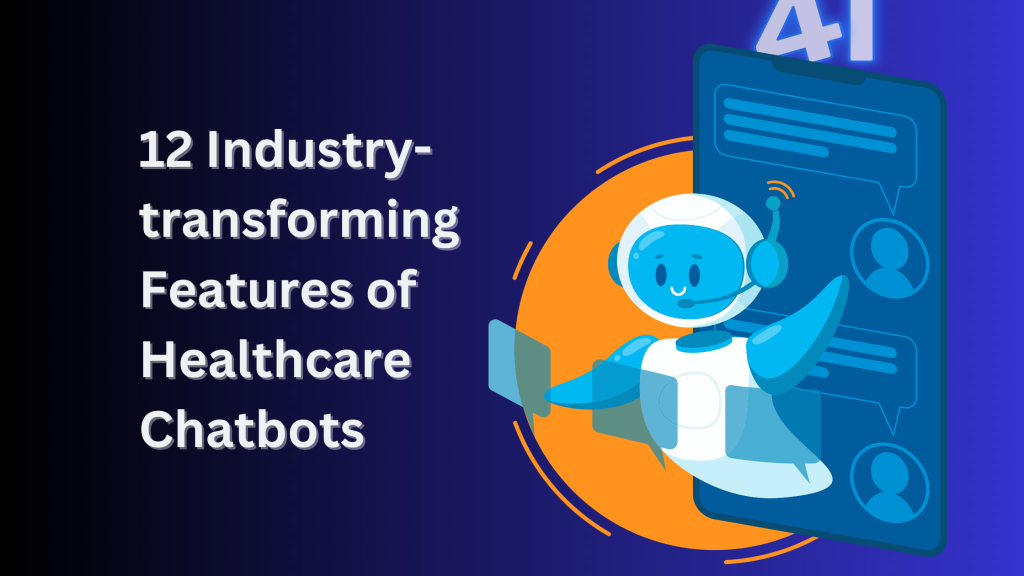Despite significant efforts in healthcare, the industry suffers from some severe limitations that impede its expansion and coverage. The top challenges among them are a lack of human and financial resources, rising healthcare costs, issues of quality, availability, and, of course, coverage.
What if I tell you there is a technology that can take care of all these challenges and transform the healthcare industry for good? Yes, there is, and the answer is AI Chatbots.
Healthcare counseling chatbots have emerged as transformative tools that use the power of Artificial Intelligence, Natural Language Processing (NLP), Machine Learning, and other revolutionary technologies to reshape healthcare provision.
This is a discussion to enlighten you on the transformative potential of healthcare counseling with AI chatbots, exploring their technology and its capabilities, benefits, and potential to revolutionize healthcare provision across diverse communities.
Understanding Healthcare Chatbots: A Technological Bridge
Suppose you have a companion with expert-level medical insights. You can reach out to him or her at any time be it a day or night, and from anywhere you are. It is just like your friend, who can understand your specific situation and gather all their knowledge to provide you with the best possible solution for your medical plight. Wouldn’t that be great? In fact, it can do more than just be great; it can literally save lives!
This is the essence of healthcare chatbots: digital assistants packed with deep knowledge and insight into the medical field and with the capability to engage in humanized conversations seamlessly.
The magic lies in two essential technologies: AI (Artificial Intelligence) and NLP (Natural Language Processing).
AI: The Intelligence Behind the Scenes
The core engine that drives the intelligence of healthcare chatbots is AI. The technology enables these chatbots to understand the questions you ask and formulate informative responses. Think of it as the brain that processes your inquiries and generates relevant answers.
When you type or speak your questions to a healthcare chatbot, AI kicks into action. It analyzes your input, identifies the context, and refers to its vast database of medical knowledge. With this information, it crafts responses that address your queries accurately and informatively.
NLP: Conversing Naturally
But how do chatbots communicate in a way that feels so human? That’s where NLP comes in. NLP, or Natural Language Processing, is the language skill that empowers chatbots to comprehend and communicate as naturally as possible.
When you ask a question, NLP helps the chatbot understand the nuances of human language. It recognizes not only the words you use but also the context and intent behind them. This ability enables the chatbot to respond in ways that feel conversational, relatable, and remarkably human-like.
Together, AI and NLP create a dynamic duo that makes healthcare chatbots more than just automated responders. They’re interactive companions that provide valuable health information, answer queries, and offer support in a way that’s accessible and comfortable for users.
Queppelin’s Trailblazing Innovation in Healthcare Counseling
Long before AI hit news headlines and became a part of mainstream media discussions, Queppelin gained expertise in providing powerful AI solutions. With its experienced team, Queppelin emerged as a pioneering force with a remarkable collaboration that left an indelible mark on the realm of healthcare counseling. This tale showcases not only Queppelin’s huge capability but also its unwavering commitment to creating meaningful solutions.
We partnered with a non-profit organization driven by a noble mission: to prevent unwanted pregnancies, manage unsafe abortions, and enhance reproductive health awareness. This organization sought to reach the far corners of rural areas, offering women a lifeline to reliable healthcare information.
The challenge was twofold: to bridge the gap between language barriers and geographical limitations. The solution? A transformative AI chatbot adept in languages, particularly Hindi, to cater to the nuances of rural communities.
Queppelin’s team embarked on an intricate process, crafting a chatbot that not only understood but communicated fluently in the native language. The result was awe-inspiring. A digital companion stood ready to engage with women, providing healthcare information, addressing queries, and fostering a sense of empowerment.
This AI chatbot, backed by Queppelin’s technological prowess, ensured that health information was accessible around the clock. No longer constrained by distance or hesitancy, women could seek guidance and information in their own language, when they needed it the most.
This narrative speaks volumes about Queppelin’s ability to seamlessly merge innovation with impact. Beyond crafting a chatbot, they crafted an opportunity—an opportunity for women to access healthcare information previously beyond their reach. Through the partnership, Queppelin showcased not just their technical acumen for pathbreaking AI technology, but also their commitment to driving change using it.
You can read the whole success story, here. Or, you can make a new one with us by filling out the form below.
AI Chatbot: What’s In It For Your Healthcare Business?
Healthcare chatbots offer a myriad of advantages to various stakeholders within the healthcare ecosystem. From efficient operations to informed decisions, and discreet patient interactions to industry-wide innovation, these digital assistants are driving positive transformation and enhancing the way healthcare is accessed and delivered.
Healthcare Providers: Efficient Operations and Informed Decisions
Healthcare chatbots bring a host of advantages to healthcare providers. They streamline administrative tasks, such as appointment scheduling and prescription renewals. This automation allows medical staff to direct their efforts toward what truly matters: patient care. Chatbots also play a role in preliminary diagnostics by collecting patient information and aiding healthcare professionals in making well-informed decisions. This blend of efficiency and informed decision-making enhances the overall quality of care provided.
Patients: Discreet Information Access and Empowerment
For patients, healthcare chatbots serve as a discreet channel for seeking medical information and advice. Patients can openly inquire about symptoms, medications, or treatment options without hesitation. Chatbots offer swift responses, reducing the uncertainty and anxiety associated with waiting for a doctor’s appointment. Furthermore, these digital assistants deliver reliable health information, fostering patient education and empowerment. Patients are better equipped to actively engage in their healthcare journey with confidence.
Healthcare Businesses: Streamlined Operations and Enhanced Engagement
In the realm of healthcare businesses, chatbots prove invaluable for operational efficiency. By handling routine inquiries and tasks, they liberate human staff to focus on more intricate responsibilities. This optimization of resource allocation translates into tangible cost savings and enhanced patient experiences. Beyond efficiency, chatbots play a role in patient engagement by sending reminders for appointments, medications, and follow-ups. This proactive approach contributes to improved patient compliance and satisfaction.
Industry Advancement: Catalyzing Innovation and Proactive Care
The integration of healthcare chatbots is propelling the industry toward innovation. They are driving a shift from reactive to proactive healthcare. By monitoring patient data and offering tailored suggestions, chatbots play a crucial role in preventive care. This approach translates into reduced hospital admissions and lowered medical costs, benefiting both patients and the healthcare system. Moreover, their round-the-clock availability ensures continuous support and information dissemination, contributing to an empowered and well-informed patient population.
12 Industry-transforming Features of Healthcare AI Chatbots

With powerful features, Healthcare chatbots bring a lot to the table, offering timely information, personalized attention, and improved engagement.
On the one hand, healthcare providers benefit from streamlined operations, enhanced patient interactions, and data-driven insights. Conversely, businesses experience cost savings, optimized resource allocation, and improved patient satisfaction.
As the healthcare landscape continues to evolve, these chatbots are poised to play a central role in shaping a more accessible, efficient, and patient-centric healthcare ecosystem. So, let’s look into the unique feature of AI-backed healthcare chatbots.
24/7 Availability: Instant Support, Anytime, Anywhere
AI healthcare chatbots stay active around the clock, which means patients can access them at any time, even during late hours when medical offices might be closed. This feature becomes incredibly important for people who have pressing questions or concerns about their health. These instances don’t always happen during regular office hours.
Also, consider individuals in different time zones or those with irregular schedules due to work or other commitments. For them, having access to healthcare information and support 24/7 becomes even more crucial.
Timely Responses: Swift Answers, Save Lives
Healthcare chatbots are highly efficient at providing swift responses. This is literally a life-saving feature, as patients receive immediate answers to their questions. Not only does this ease worries, but it also minimizes risks faster and better.
On the healthcare provider side, chatbots excel at managing routine queries effectively. This not only streamlines operations but also frees up valuable time for medical professionals to focus on more intricate and critical tasks. The timely responses offered by chatbots contribute to a more efficient and patient-centered healthcare experience for all parties involved.
Patient Engagement: Active Participation in Care
Patient engagement is a crucial factor for quality healthcare. AI chatbots achieve this by sending timely reminders for appointments, medications, and follow-up visits. This proactive feature has a direct impact on patient compliance and improves patient outcomes as patients stay on track.
For you as a healthcare provider, this heightened involvement results in increased trust and loyalty, patients recognize the efforts made by you to ensure their well-being.
Personalized Interaction: Customized Responses for Individuals
Healthcare chatbots have the remarkable ability to craft tailored responses based on individual patients’ medical histories, preferences, and data.
Such a high level of personalization greatly enhances the overall user experience, adds value to the interaction, and makes patients feel understood and cared for.
It creates a sense of value and trust in the healthcare provider as their individual needs are addressed, and it fosters a deeper level of confidence in the healthcare services.
Administrative Support: Enhancing Healthcare Operations
Chatbots help healthcare providers manage administrative tasks. They take up a range of activities, including appointment scheduling, prescription renewals, and handling billing inquiries.
Chatbots excel at coordinating schedules, sending reminders, and even rescheduling when needed. This ensures that healthcare professionals can efficiently allocate their time while maintaining a smooth patient flow.
The ability of chatbots to handle prescription renewals adds another layer of efficiency. Patients can initiate renewals through chatbots, reducing administrative workload and enabling swift responses. Similarly, chatbots address billing inquiries promptly, eliminating the need for patients to wait for administrative staff to assist.
Ultimately, the streamlined administrative processes facilitated by chatbots allow medical staff to dedicate their efforts to delivering high-quality patient care. With administrative tasks in capable hands, healthcare providers can focus on what truly matters: ensuring the well-being of their patients.
Preliminary Diagnostics: Informed Initial Assessment
One of the valuable roles that chatbots play is aiding healthcare professionals in the initial stages of diagnosing medical conditions. They gather pertinent patient information and present potential diagnoses.
Users interact with a healthcare chatbot and share details about their symptoms and medical history. The chatbot uses this information to generate potential diagnoses based on established medical knowledge. While these are preliminary suggestions, they can offer insight into potential conditions and guide further assessment.
By having access to initial diagnostic insights, healthcare providers can make more informed decisions when prioritizing cases that require immediate attention. It helps medical professionals allocate their expertise and resources efficiently, ensuring that critical cases are addressed promptly.
It’s important to note that chatbot-assisted preliminary diagnostics don’t replace in-depth medical evaluations. Instead, they serve as a valuable tool to enhance the early stages of patient assessment and decision-making, ultimately contributing to better patient care and medical resource management.
Scalability: Efficient Expansion for Healthcare Businesses
The concept of scalability is essential for a growing healthcare business. Chatbots bring scalability by enabling healthcare organizations to handle increased demand without sacrificing the quality of patient interactions.
When a healthcare business experiences a surge in inquiries due to an outbreak or a public health campaign, instead of struggling to manage the sudden influx of queries, chatbots seamlessly step in. They are capable of engaging with multiple inquiries simultaneously, ensuring that each interaction is prompt and effective.
Moreover, as chatbots handle multiple inquiries, they don’t compromise on the quality of the responses. Patients receive accurate and relevant information in a timely manner, regardless of the volume of inquiries.
Ultimately, whether it’s during busy periods or unexpected spikes in inquiries, chatbots ensure that patient support remains effective and responsive. This scalability is a vital asset for healthcare businesses as they navigate the challenges of growth and strive to provide consistent, high-quality patient interactions.
Cost Efficiency: Optimizing Healthcare Operations
In healthcare, resources are often constrained, hence, achieving cost efficiency is a significant goal. Chatbots contribute to the optimum utilization of resources by streamlining operations and automating routine work.
Thus, they free up human resources from monotonous tasks like appointment scheduling, basic inquiries, prescription renewals, etc., for more critical responsibilities. This leads to substantial operational cost reductions.
Healthcare providers can then channel these cost savings into further enhancing patient care, whether it’s investing in advanced medical equipment, staff training, or patient education initiatives.
Furthermore, the cost efficiency achieved through chatbots isn’t just a financial advantage. It also translates to more efficient service delivery. Patients experience swifter responses, streamlined processes, and improved overall interactions.
Data Collection and Analysis: Informed Insights for Improved Care
Healthcare chatbots aren’t just conversation partners; they’re also data collectors. They collect and analyze patient data over time, which has far-reaching benefits for healthcare providers and patients alike.
Since users interact with a chatbot over several appointments, sharing symptoms, concerns, and health histories, the chatbot accumulates this data. Over time, this data becomes a valuable resource that offers insights into your health patterns, preferences, and potential risks.
Using this information, healthcare providers can identify trends in users’ health and make more informed decisions about their care. For example, they might notice recurring symptoms that weren’t apparent during individual appointments.
Patient Education: Empowering Informed Healthcare Choices
Chatbots play a crucial role in patient education by offering reliable health information and enlightening patients about their conditions, treatment possibilities, and preventive measures.
The chatbot can provide clear explanations, outlining the condition, available treatment options, potential outcomes, and steps to take for prevention.
This educational aspect empowers patients to be active participants in their healthcare journey. When patients understand their health conditions and treatment options, they can make more informed decisions. They’re equipped to ask the right questions during medical consultations and collaborate effectively with healthcare providers.
Also, patient education through chatbots promotes a sense of responsibility. Patients become motivated to follow recommended treatments and adopt preventive measures, leading to better health outcomes.
Privacy and Confidentiality: Secure Health Discussions
Privacy is paramount in healthcare conversations, and chatbots ensure just that. They create a secure environment for patients to discuss their health-related concerns, guaranteeing confidentiality and privacy.
The information related to patients is treated with the utmost care, ensuring it remains private and protected. Patients can openly communicate about their health matters without the fear of their information being compromised.
This secure platform encourages patients to share even the most personal health details. It fosters open communication, allowing healthcare providers to gain a comprehensive understanding of the patient’s situation. Patients can feel confident discussing sensitive matters, knowing that their privacy is respected.
Telehealth Support: Enhancing Remote Consultations
In the era of telehealth, where remote consultations are becoming more prevalent, chatbots are valuable allies. They play a central role in supporting these virtual appointments by assisting in gathering patient information before the virtual meeting.
Assisting from a remote location, chatbots collect essential information about patients’ symptoms, medical history, and concerns beforehand. This information is then shared with the healthcare provider, ensuring that the virtual consultation is well-informed and productive.
This streamlined process makes telehealth interactions more effective. The chatbot aids in bridging the gap between physical and virtual consultations, allowing healthcare providers to offer accurate guidance and recommendations.
A Glimpse into the Future: AI Chatbots and Healthcare
As we step forward into the horizon of healthcare, it’s undeniable that AI chatbots are set to redefine how we approach medical care and counseling. Let’s take a moment to reflect on the intriguing case study brought to light by Queppelin, which sheds light on the transformative potential these digital companions bring.
It is a prime example of how AI chatbots are not just a trend, but a revolution in the making. This collaboration beautifully illustrates how these chatbots can seamlessly integrate with healthcare to create a more efficient and patient-centric ecosystem.
And what’s truly fascinating is how the capabilities of AI chatbots are poised to expand, propelling us toward a future where healthcare is more personalized and accessible than ever before.
First off, we have enhanced medical diagnoses. By analyzing patient inputs and medical histories, these chatbots could offer insights that support medical decision-making. It’s essentially a fusion of technology and human expertise, working together to improve patient outcomes. It’s almost like having a second opinion right at your fingertips, isn’t it?
But the potential doesn’t stop there. The second advantage is mental health support. Mental well-being is a critical aspect of healthcare, and AI chatbots can play a pivotal role here. These virtual companions could engage in empathetic conversations, offering coping strategies and resources to individuals dealing with anxiety, depression, or other mental health challenges.
And what’s truly remarkable is the confidential nature of these interactions. Users can open up about their emotions without fear of judgment, creating a safe space for seeking help.
Lastly, the future possibility of AI chatbots integrating with IoT devices and health trackers will lead to real-time health monitoring and personalized alerts. Picture this: an AI chatbot reminding you to take your medication, tracking your vital signs, and providing advice based on the collected data. It’s like having a dedicated health companion guide you toward proactive management of chronic conditions.
The synergy between technology and healthcare is undeniably exciting. The Queppelin case study gives us a glimpse of what’s possible, but it’s just the beginning. As we continue down this path, AI chatbots are set to transform healthcare from reactive to proactive, from generalized to personalized, and from limited to accessible around the clock.
In conclusion, the fusion of AI and healthcare counseling has given birth to an era of accessible, personalized, and confidential support. AI chatbots are not just virtual assistants; they are catalysts of change, transforming healthcare experiences for the better.
Queppelin’s visionary journey serves as a testament to the potential of AI chatbots to break barriers, empower communities, and redefine healthcare accessibility. As we step into a future illuminated by innovation, let us embrace the transformative power of AI chatbots and contribute to a healthier, more informed, and more connected society.






